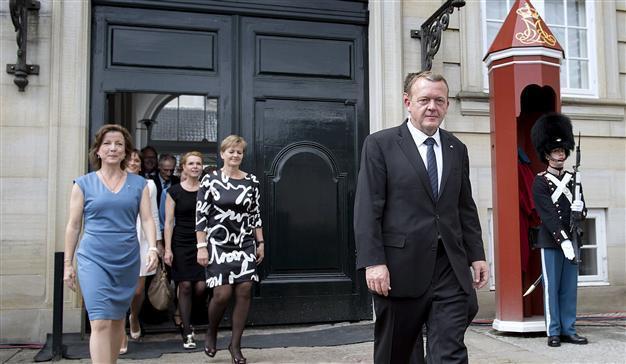Danish Liberals leader appointed PM, names his cabinet
COPENHAGEN – Reuters

Lars Lokke Rasmussen (2nd R), leader of Denmark's Liberals Party, exits the Amalienborg Palace after meeting Queen Margrethe in Copenhagen June 28, 2015. REUTERS photo
Liberal party leader Lars Lokke Rasmussen was appointed Danish prime minister on June 28 and named ministers in a government that has a small minority in parliament and will have to rely heavily on outside support on a vote by vote basis.The Liberals were part of a group of center-right parties that won a general election over a week ago but the party itself had its worst results in a quarter of a century and was unable to form a broad coalition within the bloc.
The Danish People’s Party (DF), eurosceptic and rightwing in most aspects of its policies, refused to join the government despite winning its best election result yet and becoming the largest party on the right in parliament.
It had held out on a number of demands including a referendum on whether Denmark should remain in the European Union, spending increases and curbs on immigration.
Rasmussen will now have to depend on other parties’ support, including the DF, on a vote by vote basis. He said on June 26 he would form a minority government over the weekend after talks with DF and other parties collapsed.
He named veteran party member Claus Frederiksen as finance minister, a position he has held in 2009 to 2011. Frederiksen is known to have a good working relationship with DF.
Kristian Jensen was named foreign minister. He has little experience in this sphere but has a senior rank in the party and was at one point last year widely expected to take over leadership from Rasmussen, who was hit by an expenses scandal.
With 34 seats of 179 in parliament, this is the second smallest government formed in Denmark’s history and some pundits doubt it will manage a full term. Only one government, in 1973, had fewer members in parliament, with 22 seats. That cabinet lasted 14 months.
















